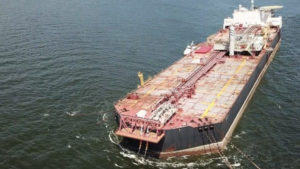 There were reports yesterday that Venezuela’s state-owned oil company Petróleos de Venezuela (PDVSA) was preparing to unload crude from the FSO Nabarima, the floating storage facility that has been listing dangerously in the Gulf of Paria for several weeks. However, it was not entirely clear how the transfer would be made.
There were reports yesterday that Venezuela’s state-owned oil company Petróleos de Venezuela (PDVSA) was preparing to unload crude from the FSO Nabarima, the floating storage facility that has been listing dangerously in the Gulf of Paria for several weeks. However, it was not entirely clear how the transfer would be made.
Two tugs frequently used to facilitate operations were spotted near the vessel on Monday and PDVSA’s Panama-flagged Aframax Icaro is reportedly en route to the Paria port of Guiria to participate in a crude transfer, according to ship-tracking data and a local contractor familiar with the planned transfer.
The Icaro is one of several tankers subject to US sanctions imposed on Venezuela but officials of the US Embassy in Port-of-Spain said the sanctions do not prevent the inspection and assistance to the vessel, as they do not target “matters of safety, environmental, or humanitarian concerns.”
“We strongly support immediate actions to bring the Nabarima up to international safety standards and avoid possible environmental harm, which could negatively impact not only the Venezuelan people but also those in nearby countries. PDVSA has a responsibility to take action to avoid an environmental disaster in Venezuelan waters,” embassy officials said.
These developments come amidst growing concern about a potential ecological disaster if the millions of gallons of oil stored onboard the Nabarima should spill into the Gulf of Paria.
Unitary Federation of Petroleum Workers of Venezuela (Futpv) executive director Eudis Girót has warned that the vessel poses “a great threat to nature and world-ecology” because it is located at the mouth of the Orinoco, adjacent to the Gulf of Paria in the Caribbean Sea and on the Atlantic border.
In a statement on his Twitter account, Girót said US sanctions should not be a hindrance to solving problems with the vessel.
“PDVSA and Italy’s ENI must remove the oil from the Nabarima. Sanctions must not be an excuse. The oil must be withdrawn in an emergency to avoid a global ecological catastrophe. They must use their own ships (Nereo, Proteus, Zeus, Icarus) and leave it stored in our territory,” he said.
In another tweet, Girót, describing the vessel’s condition, wrote: “The problems in the ship’s machine room continue, portable bilge pumps, half electric generators, locked motorised valves, inhumane working conditions. It is a permanent situation, there is no reliability in the processes.”
He called for a “powerful national movement which must promote the solution to the serious danger of Nabarima. The life of the planet and the workers is in danger. PDVSA and ENI must remove the oil from the vessel and avoid a global ecological catastrophe.”
Girót was also critical of PDVSA’s handling of the situation.
“The complaint was made by the workers on August 30, 2020, and the problem has been deepening. PDVSA has repeatedly denied this tragic reality and developed a campaign of infamy, disqualifying the complaint, accusing the workers of being traitors and saboteurs.”
Girót said the transfer of the crude from Nabarima to other ships is the best option.
“In the Nabarima there are 1,800,000 barrels. That fits in two medium-capacity tankers. The position should be to remove it from the Nabarima and place it in a safe tanker that can be in the Venezuelan sea, ” he said.
Also warning about the gravity of the situation was Eduardo Klein, coordinator of the Centre for Marine Biodiversity at Venezuela’s Simón Bolívar University. However, he said the “probability that everything will spill is very low because not everything is in a single container.”
Klein said the overflow of thousands of barrels of oil in the area would not only affect the Paria peninsula but would flow to the north and affect T&T. He has been using satellite images to study the impact of oil spills in Venezuela and recently did an analysis of what could happen if 20,000 barrels of crude were spilt from the Nabarima. He said it would be “an environmental catastrophe.”
Klein’s oil spill simulation is based on a GNOME-NOAA model. He said the trajectory of a spill depends on winds and high tides in the Gulf of Paria. He said the Venezuelan government must act to contain the spill as soon as possible and should develop a contingency plan.
